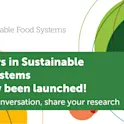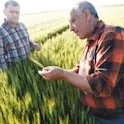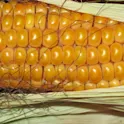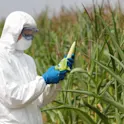
Climate action
06 Feb 2018
Key challenges for food security in the face of climate change
Meeting UN Sustainable Development Goals for food security requires a climate-smart approach: Frontiers in Sustainable Food Systems

Climate action
06 Feb 2018
Meeting UN Sustainable Development Goals for food security requires a climate-smart approach: Frontiers in Sustainable Food Systems

Sustainability
07 Nov 2017
A wild yeast described in Frontiers in Microbiology could be an eco-friendly alternative to chemical pesticides.

Frontiers news
16 Oct 2017
Today, on World Food Day, we are thrilled to announce the launch of Frontiers in Sustainable Food Systems which publishes rigorously peer-reviewed research

Life sciences
26 Sep 2017
Recent research in Frontiers in Ecology and Evolution reveals Easter Island’s population may have reached 17,500 people during its prime, far off early estimates of a much smaller population.

Environment
26 Jul 2017
Scientists demonstrate that the indigenous knowledge of smallholder farming communities may yield genomic targets useful for wheat breeding.

Sustainability
11 Jul 2017
Food, health, and environmental sustainability: interconnected issues to be tackled. Experts discuss at the EAT Stockholm Food Forum 2017.

Sustainability
15 Dec 2016
Using crop models as a tool to assist nitrogen management decisions in corn as a win-win for the agronomy business and the environment — By Kate E. Larkin — With an innovative modeling approach, researchers set out to examine corn and soybean yields and optimal nitrogen (N) fertilizer rates. In their study, recently published in Frontiers in Plant Science, they uses a 16-year long-term dataset from central Iowa, USA, with a state-of-the-art simulator that modeled corn and soybean yields, improving predictions of optimal N fertilizer rates for corn. This has global relevance for food security and sustainable agricultural practices in light of future climate change scenarios. Corn, also known as maize, is one of the top three staple crops farmed globally with global production predicted to rise from 720.8 million tons in 2015 to 872.9 by 2030, according to the Food and Agriculture Organization. Corn also requires large nutrient supplements in the form of fertilizer due to its fast-growing, nitrogen hungry characteristics. And global demand is growing. “A huge challenge in agriculture is predicting the optimal N fertilizer rates which, if fine-tuned, can reduce N losses and increase profits”, explains Laila Puntel, a graduate student and research assistant […]

Featured news
08 Nov 2016
Two major dependencies can be alleviated by increasing legume cultivation. These are the dependency of nitrogen fertilizers and the dependency on imports.

Health
31 Oct 2016
By Hedwig Ens, Frontiers The impact of our dietary choices on the global phosphorus footprint shouldn’t be neglected, recent research in Frontiers in Nutrition shows. A shift towards a plant-based diet may be an undervalued solution toward decreasing our environmental impact and attaining phosphorus sustainability. Phosphorus is an element essential for all living beings and is thus critical in food production. Mined phosphate rock is a non-renewable global resource that is nowadays becoming increasingly scarce which poses a severe problem to the farming industry: it needs phosphorus in the form of fertilizers to sustain crop productivity. Crops have two entries into the human food chain: direct consumption or indirect consumption by rearing animals which can be converted to human food. Different food types therefore require different amounts of phosphorus in their production. One kg of phosphorus can for example be used to either produce 3333 kg of starch roots (e.g. potatoes) or 16 kg of beef. The loss of phosphorus to waterways, whether from agricultural fields through runoff or urban sewage through human excreta, can cause severe water quality degradation. This leads to eutrophication, harmful algal blooms, and impairment of our drinking water, recreational areas, and fisheries. As the […]

Sustainability
12 Sep 2016
by Emily Barker, Frontiersin.org Modified crops are nothing to be scared of and could be essential in solving the global sustainability crisis, explained Dr. James Lloyd, Deputy Field Chief Editor for Plant Biotechnology in the open-access journal Frontiers in Planet Science. Much of southern Africa is currently suffering consecutive seasons of drought, and farmers in Eastern Kenya have lost more than 80% of their crops due to lack of rain. These droughts, caused by climate change, could potentially leave 36m people across Africa facing hunger. However, there is hope in drought resistant crops. Over a five-year period, a total of 2.9 million farmers in 13 African countries saw their yields increase by 20% to 30% after sowing a variety of drought-tolerant hybrids. “I think that using this type of technology has huge potential to increase crop yields and I would be optimistic that we can increase food production as we need to in the next years or so,” he added. Making modified starch more ecofriendly Dr. Lloyd and his team, who are based in South Africa, have currently been working on increasing the amount of phosphate that’s bound to starch by manipulating plant genes. Modified starch is used by the paper […]

Featured news
15 Aug 2016
by Hedwig Ens, Frontiersin.org Ever thought of putting sewage on your plants? Scientists say thermally conditioned sewage sludge serves as an excellent fertilizer to improve soil properties. This was recently published in the open-access journal Frontiers in Nutrition. The major advantage over commercial fertilizers? Sustainable re-use of essential and finite phosphorus resources. Phosphorus is a key nutrient for all living beings. When deficient in the diet, it severely compromises human health, and when deficient in agriculture, it restricts crop productivity. Without phosphorus, there can be no food production. As the source of phosphorus is non-renewable phosphate rocks, there is a strong need for increased recycling to ensure phosphorus security. Efficient use and reduced environmental dissemination of phosphorus throughout the food system is needed to secure the ability to feed a growing global population. As technological improvements increased the phosphorus content of sewage sludge, it now is a readily available alternative to commercial fertilizers in agriculture. To assess its effectiveness, Andry Andriamananjara from the University of Antananarivo (Madagascar) and his colleagues used a phosphorus radiotracer technique to measure the availability of phosphorus for plants in thermally conditioned sewage sludge. They grew ryegrass in pots filled with soil that underwent isotopic P-labelling, […]
Get the latest research updates, subscribe to our newsletter